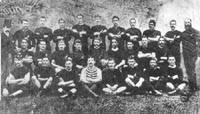Nineteenth Century Sport
How did 'organised' sports like rugby develop? During the nineteenth century, the anarchic and violent games that had been played between villages or parts of towns in Europe at specific times of the year since the Middle Ages were tamed into more disciplined forms.
This development owed something to the desire of industrialists to improve work discipline and productivity by reforming play. Attempts were made to organise 'rational recreation' under a middle-class control which often embraced a newly 'muscular Christianity'.
Reformers saw football, for example, as superior to cockfighting; increasingly played on purpose-built fields rather than on the streets, it could help to differentiate potentially 'respectable' working men from the 'dangerous classes' who were seen as threatening the established order of society. In practice, however, new forms of games often became outlets for new expressions of an old sense of communal loyalty.
Most of the sports of the Victorian era were exclusively male domains. Men employed in offices and factories sought to express themselves physically outside work. They were increasingly able to do so as working hours were regularised. Sport paralleled the sexual division of labour.
The sports played by men embodied 'masculine' qualities such as physical strength, stamina, teamwork, and craftiness in bending social 'rules' to their breaking point. As Jock Phillips has argued (A Man's Country?, Auckland, 1987), in New Zealand rugby was the ideal recreational activity through which such 'frontier' values could be played out after the frontier itself had disappeared. There was little consciousness that women might want to express any similar qualities.
Men's dedication of time, space and money to recreational pursuits was an expression of male power: they were free to play sport rather than relate to their partners and children, and free too to take part in related gambling and drinking activities if they wished. Men demonstrated that they were 'good providers' by the very fact that they could publicly take time off from work to indulge themselves with their 'mates'.

A studio photograph of the New Zealand Natives.
NZ
Rugby Musuem
Fullback
Billy Warbrick feared no one on the football field.
Eyton, Rugby Football Past and Present